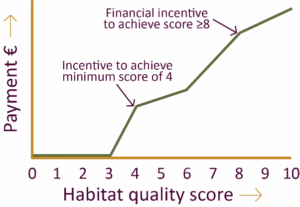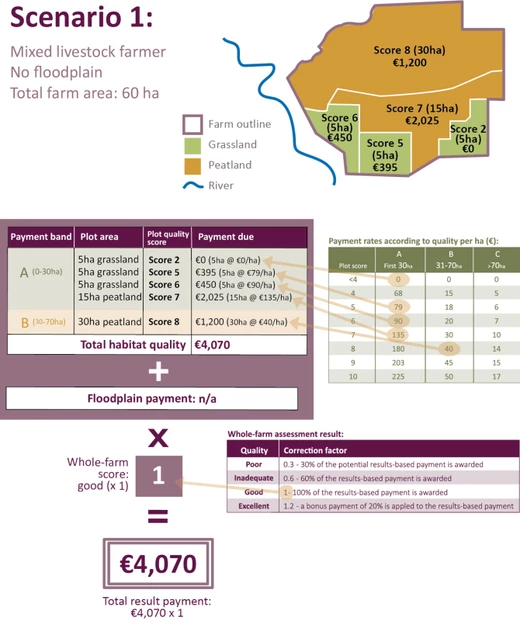
Results-Based Payment Scheme (RBPS)
Wild Atlantic Nature Results-Based agri-environment Payment Scheme (RBPS) pilot was implemented in 2021-2022 to develop capacity among participating farmers, farm advisors, policy-makers and scientists for delivering improved ecosystem services – including water quality, biodiversity and climate regulation – in a way that works for landowners and the environment. The primary target was eight Natura 2000 sites in northwest Ireland designated for blanket bog habitat. The RBPS approach directly links farmers’ agri-environment payments to the ecological condition of their land, thereby rewarding good environmental management and incentivizing improvement on lower scoring lands. 823 farmers across 63,000ha of Natura 2000 and contiguous land participated in the Wild Atlantic Nature RBPS. All participants attended one or more of 19 training sessions in environmental assessment and land management.
Payments relating to environmental services of €3m were made to farmers and 52 farm advisors were trained and contracted to conduct ecological assessments for their clients. More than 100 scientists, policy-makers and government officials participated in RBPS training and capacity-building workshops. Importantly, RBPS provides a clear implementation mechanism for peatland conservation and restoration at scale. The project team continue to provide financial and technical supports to hundreds of farmers who are undertaking actions to improve ecological condition. The learnings from the pilot informed the development of the Department of Agriculture’s results-based ACRES CP programme, which is currently being delivered for 20,000 farmers in the Common Agricultural Policy Strategic Plan for Ireland (2023-2027) to the value of €150m p/a.
Wild Atlantic Nature RBPS material can be found here.
What is a Results-Based Payment Scheme?
Results-Based Payments Schemes directly link payments to the environmental quality of a farm, with higher nature quality resulting in a higher payment level. All participating land, both private and commonage, is divided into plots which each receive a habitat score annually of 0 to 10, depending on environmental quality. This score determines the payment levels.

Supporting actions
Supporting actions are voluntary measures that a farmer may choose to undertake with the aim of improving habitat quality. Where a farmer (or group of farmers) wished to carry out supporting actions, additional funding was available. Typical supporting actions funded by the programme included fencing, invasive species control, livestock drinking facilities, peatland reactivation and drain-blocking.
Sample farm payment calculations

